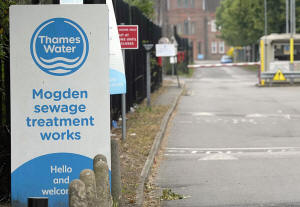Judge approves emergency plan to keep Britain’s largest water company
afloat
 Send a link to a friend
Send a link to a friend
 [February 18, 2025] By
BRIAN MELLEY [February 18, 2025] By
BRIAN MELLEY
LONDON (AP) — A judge approved an emergency plan Tuesday to keep
Britain’s largest water company afloat, averting the possibility of a
temporary government takeover.
Thames Water, which serves 16 million customers in and around London,
was seeking court approval for about 3 billion pounds ($3.8 billion) in
rescue loans to prevent it from being nationalized when it runs out of
cash next month.
Justice Thomas Leech ruled in the High Court in London that the
company's restructuring proposal was a better alternative for the public
than having Thames Water become insolvent and come under government
administration, or a competing plan by a small group of investors.
“There is a public policy in favor of rescuing the Thames Water Group
and giving the market a chance to agree a permanent restructuring plan
before the government is forced to fund a special administrator," Leech
said.
Without the funding, Thames Water would run out of money next month,
which could force the government to temporarily take the reins. Both the
government and Thames Water said water would continue flowing to
customers regardless of what happens.
The decision was applauded by Thames Water Chairman Adrian Montague as a
“significant milestone” to strengthen the company's finances.

Thames Water has been the focus of criticism from consumers and
politicians who say the company was the author of its own misfortune,
paying overly generous dividends to investors and high salaries to
executives while failing to invest in pipelines, pumps and reservoirs.
Company executives say the fault lies with regulators who kept bills too
low for too long, starving the company of the cash it needed to fund
improvements.
[to top of second column] |

A general view of Thames Water plant in Twickenham, London,
Wednesday, June 28, 2023.(AP Photo/Frank Augstein)
 Thames Water and the water industry
have been the subject of nationwide disgust and outrage over rampant
sewage spills in rivers and along the coast.
“This national scandal is a disaster for Thames Water billpayers and
the environment," said Charles Watson, chairman of River Action, an
environmental group. “Instead of recognizing now is the time for a
special administration of Thames Water, the decision saddles
customers with the responsibility for funding billions of junk-rated
debt while its executives, investors and shareholders escape
responsibility."
Ofwat, which regulates water companies in England and Wales, in
December approved a 35% increase in Thames Water’s consumer charges
over the next five years. The company argued that bills needed to
rise by 53% in order to finance needed projects and provide the
financial returns necessary to attract investors.
The company faces massive penalties for sewage discharges, including
a fine of more than 100 million pounds ($126 million) by Ofwat in
August for failing to manage its wastewater treatment.
Leech had been considering competing proposals to provide credit to
the cash-strapped utility — one from Thames Water and a second
supported by a smaller group that claimed the company's plan was too
expensive and favored bigger investors. Creditors holding most of
the company’s debt backed the company deal.
Leech said the viable alternative wasn't the so-called Plan B, but a
government administration that he said wasn't as attractive as the
company's plan.
All contents © copyright 2025 Associated Press. All rights reserved |